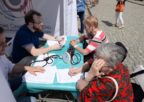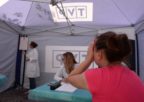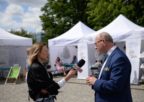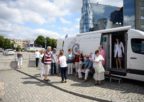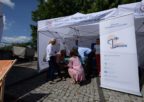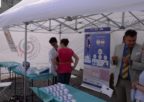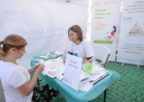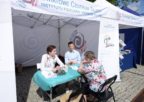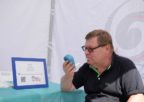The fourth edition of the “Multi-specialist year-long programme for preventing civilisation diseases and supporting Poles’ health – Health First” was officially launched, just like last year, outside the Polish Television and Polish Radio buildings. Residents of the capital city were offered advice by several dozen physicians representing various specialities. Those interested had an opportunity to consult audiologists, phoniatrists, otolaryngologists, periodontists, ophthalmologists, cardiologists, haematologists, specialists in the field of child and youth psychiatry, dermatologists and dieticians.
The aim of the “Health First” Programme is, among other things, to shape health-promoting attitudes in our society – stressed Prof. Henryk Skarżyński, the originator and initiator of the Programme, in his interviews. – Screening tests allow large populations to be examined for disabilities and diseases that represent a growing problem in our society. Thanks to such tests, diseases that could have been undiagnosed for years are detected at a very early stage – said Prof. Skarżyński. After he appeared on Polish TV and Polish Radio to invite residents of the capital city to the medical city, first patients showed up. A queue was formed as people waited to be examined at Mobile Hearing Centres, i.e. vehicles with a doctor’s surgery and a hearing examination booth. The patients asked to have their hearing tested, but many sought help because they were unable to see a laryngologist at the local clinic without waiting a long time. – Water got into my ear when I was washing my hair. I’ve been hard of hearing for a week, but the appointment with a specialist was scheduled in four months – complained one of the patients. Many people came to a Mobile Hearing Centre because of tinnitus that persisted despite taking the recommended medicine. One of the patients complained that the “creaking” in her ear is intensifying, and the physician at the clinic can’t find a way to alleviate the condition.
A long waiting time at a clinic was also a problem reported by people seeking consultation with three dermatologists – Tomasz Pniewski, MD, dr. Bartłomiej Święs and dr. Julia Sieczych from the Dermatology Clinic of the Medical University of Warsaw. Hot June reminded Varsovians that excessive UV radiation may contribute to the development of skin cancer. That’s why the topic of protection against the sun returned during the consultations, and the patients wanted to have their marks examined.
During meetings with patients, dr. Damian Małecki, dr. Bartosz Krzowski, dr. Krzysztof Ozierański, dr. Mateusz Piorunek and dr. Rafał Gajewski from the Cardiology Clinic of the Medical University of Warsaw repeated that a lot of water should be drunk on hot days. This is not so obvious, especially for the elderly as their thirst decreases with age. Pressure measurements indicated that many seniors showing up in the cardiological section might be dehydrated (typical in such a case is reduced blood pressure and heightened heart rate). The cardiologists also answered a lot of questions that nagged the patients concerning, among other things, hypertension, atrial fibrillation and coronary disease.
There was also a lot of interest in consultations with dieticians from the National Food and Nutrition Institute. How to lose weight, how to reduce appetite and shift to a healthier diet, what diet is appropriate in the case of a slightly increased sugar level, what to eat after pregnancy – these were the most common questions asked by those who sought consultations. – The conversations with the volunteers only confirm what dieticians often highlight – a patient is unable to estimate how much they eat – summed up Klaudia Wiśniewska, MSc. Some thought that they ate very little, but they put on weight, while others believed that they ate sufficiently, but they are too skinny. During the consultations it turned out that patients misestimated the caloric value of their diet. Overweight people ate too many calories, whereas patients complaining that they could not put on weight ate e.g. two low-calorie meals per day. At the stand of the National Food and Nutrition Institute, like in last year’s edition of the “Health First” Programme, patients could have their body composition analysed.
Consultations with ophthalmologists were also very popular among patients. Dr. Aleksandra Opala and dr. Ewelina Czapka from Ophthalmology Clinic at CMKP examined patients i.a. for glaucoma, which may develop without any noticeable symptoms, and answered questions about how often one should have their eyesight tested, what is the difference between an ophthalmologist and optician, how to protect eyes from UV radiation, and how to put on contact lenses.
As every year, there was a large team of periodontists offering consultations outside the building of Polish Television, including, among others, Prof. Renata Górska, chairperson of the Polish Society of Periodontology and Maciej Nowak, MD, PhD, secretary of the Polish Society of Periodontology and Mazovian voivodeship consultant in the field of periodontology. The specialists in this field, which is still little known in Poland, explained the patients during the consultations the correct principles of oral hygiene, e.g. recommending toothpastes not only with added fluorine but also zinc, which enhances its effect, as well as recommending the use of electronic toothbrushes – still not very popular in Poland – which brush teeth more thoroughly. 80 per cent of periodontal diseases can be successfully treated by dentists, and only 20% of the most severe cases require treatment by a periodontist.
On the occasion of the official launch of this year’s edition of the “Health First” Programme, consultations were also offered by specialists in the fields of haematology and oncology. Answering patients’ questions, they recommended them to have a complete blood count performed once a year. – Thanks to this basic test, a lot of blood and marrow diseases can be detected, including cancer – said Prof. Iwona Hus, specialist in internal diseases, haematology and oncology. – This is very important, as many haematological cancers do not show any noticeable symptoms at an early stage – emphasised Prof. Hus. Those that require an immediate visit to a doctor include: infections that do not disappear after antibiotics, weakness, skin blotches, gum or nose bleeding, fever without any infection, cold sweat at night.
Speaking about risk factors in the development of cancer, it is impossible not to mention smoking. Those still addicted to nicotine may find out in the medical city near Polish Television what the level of their body poisoning is by having carbon dioxide level in the lungs measured.
Just like last year, outside the building of Polish Television there were also specialists in the field of child and youth psychiatry. Mental issues are increasingly common among the youngest, while access to specialists in Poland is very difficult. – Nothing has changed in the clinical practice since last year, but overall awareness of the problem of mental disorders among children and teenagers has increased – said Barbara Remberk, PhD, national consultant in the field of child and youth psychiatry.
Just like last year, on the initiative of the Minister of Health, a mammography mobile vehicle and blood-collecting bus were placed outside the building of Polish Television. There were also stands where residents of the capital city could have a European Health Insurance Card issued without waiting in a queue and set up a trusted profile, which is necessary for receiving electronic benefits as part of health care (pacjent. gov.pl). Consultations in Warsaw are just the beginning of this year’s meetings with physicians representing different specialities.
Similar medical cities will crop up throughout the summer in different parts of the country.






